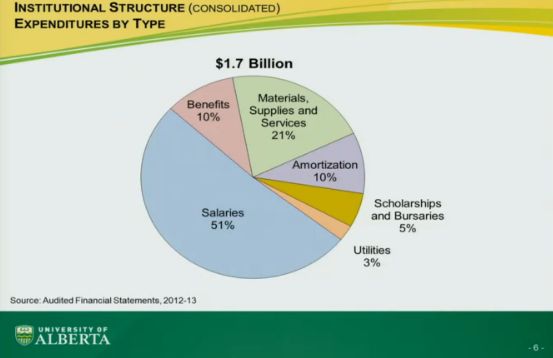EDMONTON – With the 2013-14 school year official underway, students and staff at the University of Alberta were given a first-hand look Friday afternoon at the school’s troubling financial situation.

Hundreds showed up to a campus forum held over the noon hour, during which University officials tried to explain exactly how the U of A has gotten to its current state, and opened the floor up to questions.
Months after the provincial budget, in which post-secondary education took a hit of more than seven per cent, the U of A faces a $28 million cut in its 2013/14 budget and $56 million in its 2014/15 budget – a total $84 million reduction that the U of A originally hoped to spread out over the course of three years.
Officials say the tighter timeline has left them with “less wiggle room.” Areas that are being affected as a result include: suspending admissions to 20 Arts programs, scaling back course options for science students and reducing enrollment numbers, as well as a plan to reduce staff.
While giving an overview of how the University comes up with its budget, Vice-President (Finance and Administration) Phyllis Clark showed that 61 per cent of the institution’s money goes to salaries and benefits.

In August, the U of A announced that it will be offering voluntary severance packages to staff in hopes of saving money. During the campus forum, a support staff member asked how exactly that will be accomplished.
Acting Provost/Vice-President (Academic) Martin Ferguson-Pell said the University will know how much of its budget will be mitigated by the voluntary severance program by late September.
“It then helps to set the tone, if you like, for the other cuts that we’re going to have to take, and the amount of dollars that will have to be taken out of individual faculties going forward.”

Get daily National news
He adds that the University is also continuing to have discussions with the Association of Academic Staff at the University of Alberta (AASUA) as well as the Non-Academic Staff Association (NASA) – both of which in late August voted against opening contract negotiations.
“We are going to continue to investigate that with them to see if there’s any room for negotiation,” Ferguson-Pell says.
Rod Loyola of NASA is firm, though, in the fact that the membership does not want to open the collective agreement.
“We’re not gaining here. We’ve already cooperated enough with the U of A. I think it’s time they look at other areas,” he says.
A member of the Faculty of Medicine asked at the campus forum why the University is not looking at increasing tuition as a way of generating revenue.
Ferguson-Pell explained that their hands are tied on that front at the moment, due to a decision by the provincial government to freeze tuition this year. You can hear his full explanation in the video below:
The question was also asked whether international fees may be going up.
“Everything is on the table…we are definitely looking at them,” admits Clark.
Students, meanwhile, are feeling the uncertainty.
“We’re still left in the dark and not able to properly and fully engage in these discussions surrounding the budget,” argues Petros Kusmu, President of the U of A Students’ Union.
“We were promised that these budget cuts were not going to fall on the backs of students. But at the end of the day, it’s pretty clear that they are.”
Others are also expressing what they feel has been a lack of transparency on the part of U of A officials throughout the process of deciding cuts.
Ferguson-Pell says those concerns have been heard by the deans, who moving forward, “will strive to the highest level of transparency” that can be achieved.
On behalf of the Wildrose’s Advanced Education Critic Bruce McAllister, a member of the party essentially asked what can be done to prevent this kind of situation in the future.
In response, Ferguson-Pell says he’s proud of how the University has used its resources in the past but it hasn’t allowed to build up a reserve – something which is admittedly risky in a resource-dependent economy such as ours.
“We can ride out some of those challenges under normal circumstances, but what made this year so distinctively different was the short-notice and the magnitude…(they) were out of proportion with what our expectations were. And so that is what has made this such an, I think, difficult situation for us.”
You can watch the broadcast of the campus forum below:
With files from Fletcher Kent, Global News

Comments